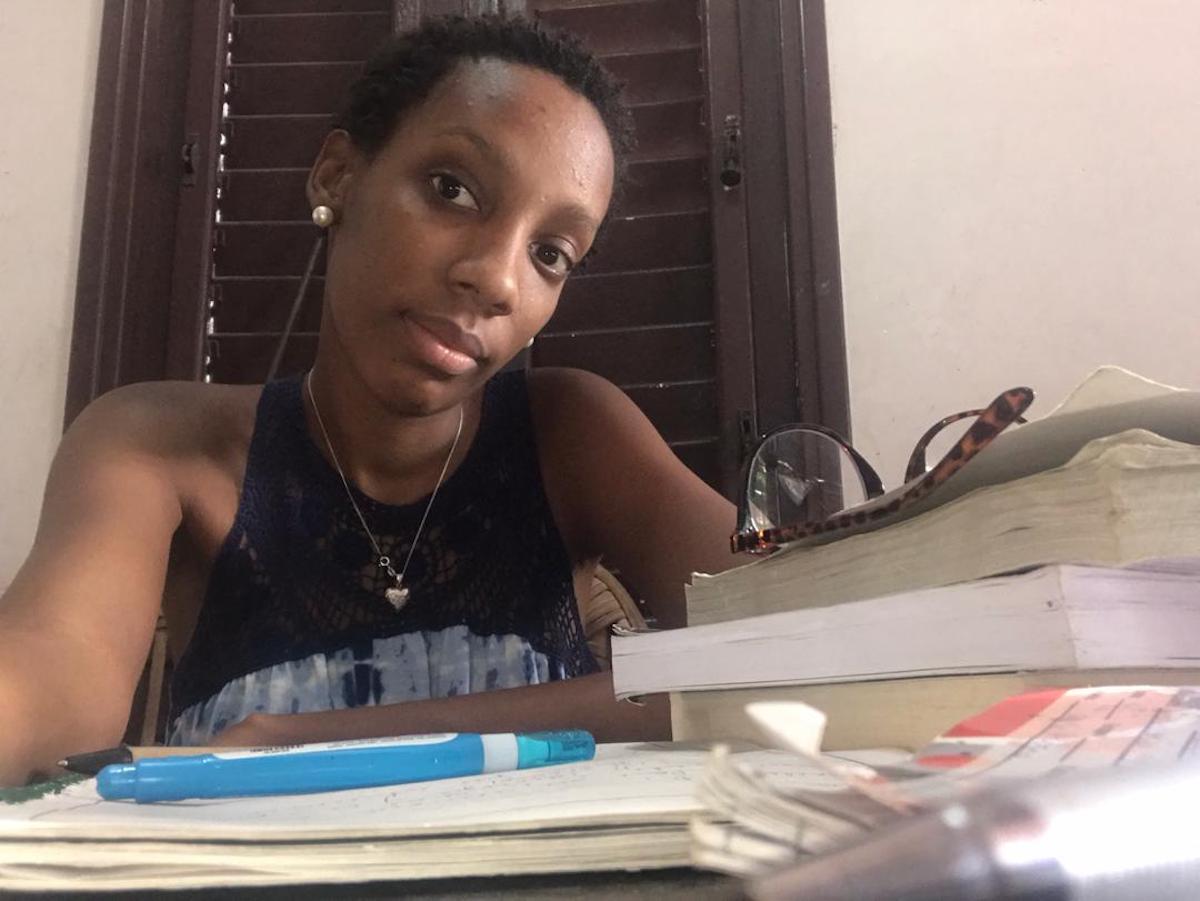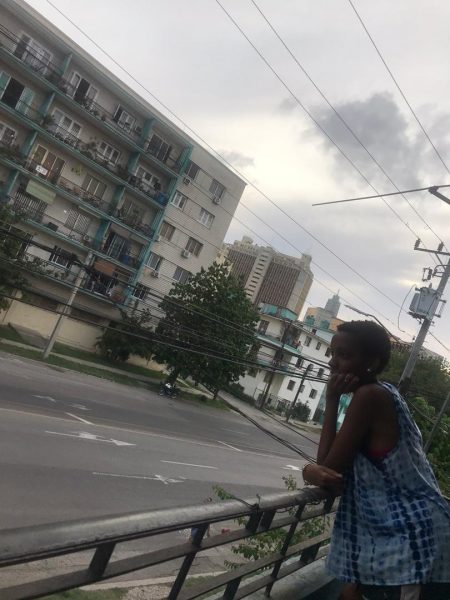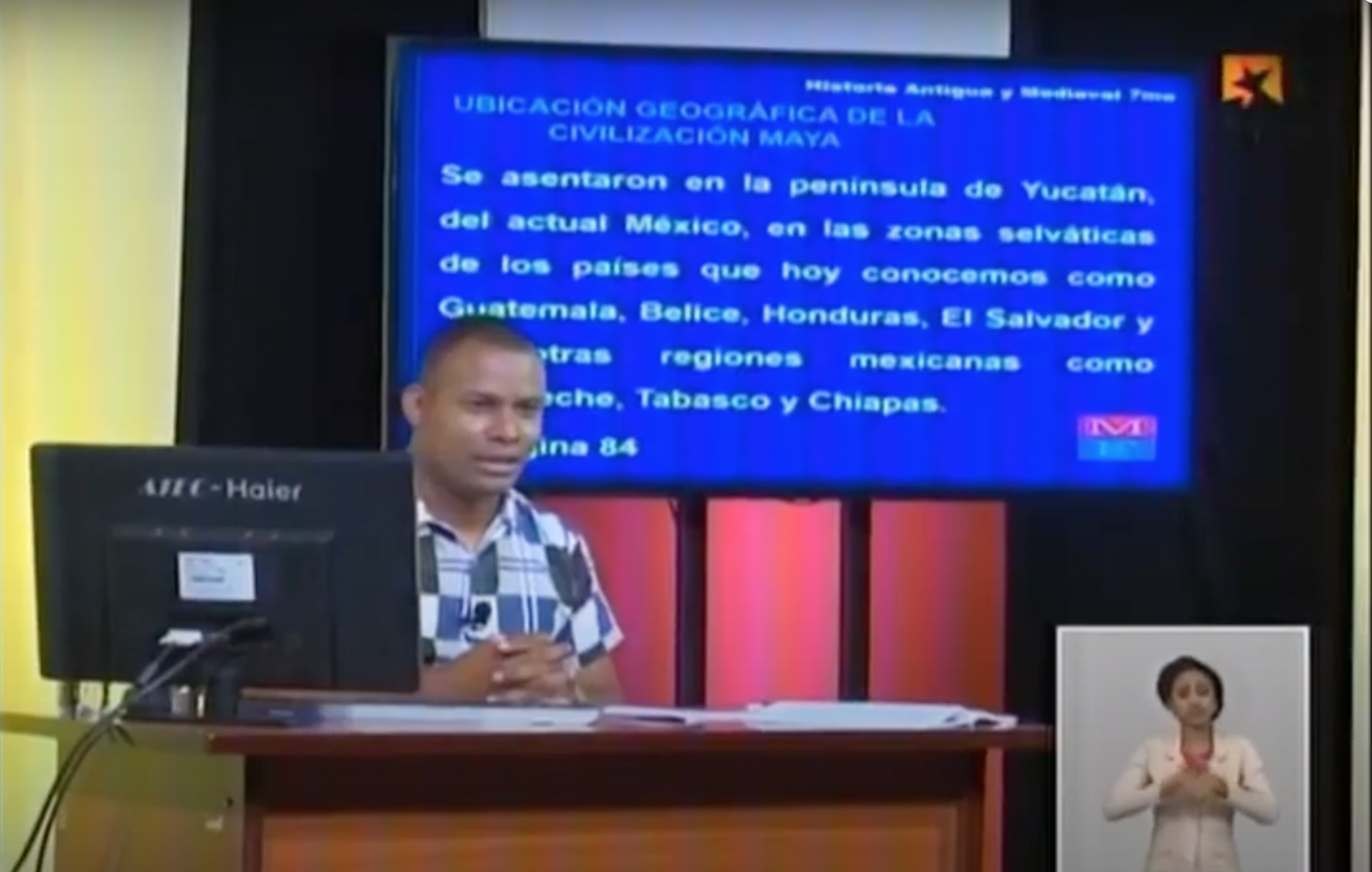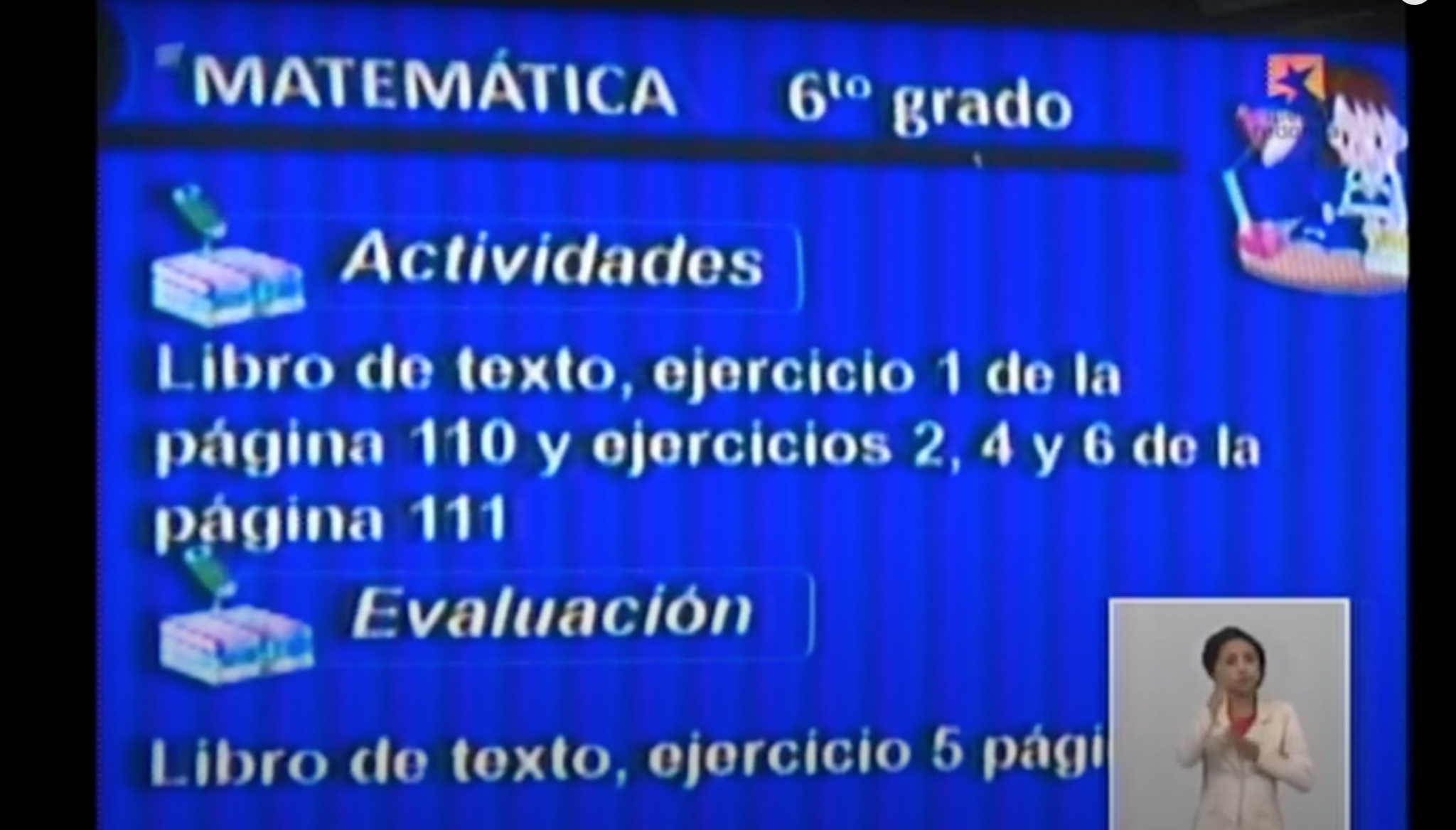

Eliani Matienzo is trying to make progress on her thesis while self-distancing in her Havana apartment. (Photo provided by Eliani Matienzo)
Eliani Matienzo of Havana has not had a college class since schools across the country closed to fight the spread of coronavirus in late March. The 23-year-old spends quarantine inside her apartment watching TV with her mother, waiting for updates on how this pause in her education will affect her plans. The epidemic has completely brought university education to a halt on the island, where precarious internet access makes transitioning to online classes impossible: An hour online is $1, and the average monthly salary is around $30.
While Eliani sits idle, her 15-year-old cousin Ángel, on the other hand, attentively tunes in to his 9th grade school lessons on his family’s TV set. Without universal internet access, the Cuban government has turned to television to broadcast courses for primary and secondary students. But universities cannot do the same because courses vary greatly across majors, unlike the universal curriculum of the early education levels. Instead, students like Eliani are left indoors unsure of what an unfinished semester may mean for their future.
“I’m still in contact with all the students in my class, but we’re not talking about school at all because at this moment courses have been suspended,” Eliani said.
With all six of her courses canceled, there has not been much for her to do but try to keep in touch with classmates over WhatsApp, but her cellular data, a novelty in Cuba enjoyed by about less than half the population, is to expire in a few days. She also keeps in contact with the American exchange students who studied at the University of Havana alongside her this semester, though they are currently finishing their coursework online back in the U.S.
After their last day of classes on March 23, Eliani and her classmates began to use WhatsApp to share course materials from their professor in order to continue learning in their Sociology of Health and Illness course independently. Some members of the group —whether due to not having a phone or having run out of data— would scramble to connect on the phones of their parents or other family members. However, the Ministry of Higher Education disallowed independent learning between students and professors on April 9 since inaccessibility to internet was causing students to leave their residence and break social-distancing measures in order to go to one of the country’s 1,047 Wi-Fi parks to connect online.
“It is true that there is uncertainty here like there is in almost all countries, but in Cuba there is obviously an additional problem and that is that internet still is not sufficiently distributed enough to assume that everyone has access,” Dr. Rainer Schultz, a Harvard historian based in Havana, wrote in an email. “The Ministry of Higher Education has made the decision not to continue online classes because in Cuba there is an equitable approach that all students must have the same opportunities.”
Even if internet were accessible to all students, American platforms such as Zoom or Whiteboard would still be blocked in Cuba, Schultz noted. They fall under the category of a “prohibited transaction” by cyber sanctions imposed by the United States Department of the Treasury.
In Limbo
Using some of the remaining minutes on her phone, Eliani calls her little cousin Ángel one evening after clapping on her balcony for the healthcare workers getting off shift, a new nightly ritual for her mother and her. Ángel now wakes up late and watches his lessons on his family’s television set in the afternoon. He tells her he misses saying good morning to his classmates and teachers at the Escuela Solidaridad con Panamá, a special education school for students with physical or mental disabilities from pre-K to the 9th grade.


Eliani Matienzo on her balcony, waiting for life in Havana to pick back up. (Photo provided by Eliani Matienzo)
Those at his school with mental disabilities have been instructed to follow the lessons that pertain to what would technically be of a lower grade level while at home, said teacher Lorell Caballero Zayas.
Ángel —like all Cuban students— was initially set to return to school April 20, but the Ministry of Education announced that the educational programming would instead enter its second phase and last until the end of the school year. While lessons for elementary schoolers have concluded, mathematics and history lessons have doubled for upper grade levels, following suggestions from parents about these subjects warranting more time.
“The majority of the instructive activities transmitted on TV are live, which works to our advantage in case one does not work well one day or if a parent has a concern,” Minister of Education Ena Elsa Velázquez Cobiella said on April 17 on the Cuban news program, Mesa Redonda, when announcing the extension of online classes.
She recalled the case of a father from the eastern province of Las Tunas who called because his son in the 8th grade could not tune in to broadcasted lessons due to the family not having a television. In situations like these, the Ministry’s regional directors quickly obtain families’ contact information to find a solution. Sometimes recordings are brought to a student’s house, or they may be authorized to use the television at the nearest school, in a way that still conforms with social distancing measures.
But without any technological adaptation of the college curriculums, university students like Eliani remain unclear of what is to come—whether they should expect to spend an extra year to make up for lost time or perhaps enroll in a summer session if the county’s onward ascent of over 1,700 cases begins to flatten.


The filming of a geography lesson, courtesy of Mesa Redonda
She is concerned about making progress on her thesis, which is a graduation requirement for many programs.
“In the fourth year of the sociology track, there is a course called Sociology of the Family which works to prepare you for your thesis,” Eliani said, who was preparing to enter her final year of the sociology program at the University of Havana before the pandemic. “You have to do the first and second chapter of the thesis before entering your fifth year. By not having that class, we’ve lost that time.”
For several hours each day, Eliani tries to work on her thesis about the dual role of Cuban women in the workplace and at home, but she is finding it much more difficult to work from her small apartment in Havana. While she hopes her efforts will prevent her from falling behind, she admits her work is greatly curtailed by being unable to meet with her teacher to revise these early chapters.
Lack of Clarity
Primary and secondary level students will progress to the next grade level, according to the Ministry of Education, but it remains unclear what is to happen to university students, especially those who may not qualify to graduate due to lost time working on theses.
Daileydi Delgado Día, a fifth year studying agriculture at the University of Havana, said in a YouTube comment that she is frustrated with the Ministry of Higher Education’s avoidance of specifics regarding plans for these students.
“Myself and all Cuban students in their fifth year would like to know what will happen to our thesis work, since Mesa Redonda does not say anything concrete,” Día wrote. “If a measure is going to be taken, what will it be? Many of us have not been working on our theses because we are unable to move from place to place.”
Gerardo Hernández, a tourism student in his final year at the University of Havana, is also unable to continue work on his thesis from his home in Artemisa, a small province outside of Havana. He has not had access to the necessary readings and materials since he returned to his parents’ house after the university shut down.
“There’s an uncertainty regarding what could happen next. All I have left to do is graduate and there is that uncertainty if that will happen this year or next,” Gerardo said from his childhood bedroom. Instead of working on his thesis, he now spends most of his time with family, working out, and using up the data he has left to keep in touch with friends still in Havana.


Math assignments for 6th graders on Canal Educativo in Cuba, courtesy of Mesa Redonda
Eliani emphasized that “It’s important for students who are in their last year to graduate this year because some may have a vulnerable economic situation and need to help at home.” The housing crisis in Cuba —which forces generations of families to live together under one roof— also makes it difficult for some students to spend another year at home. Some are eager to enter the job market in order to secure housing alternatives.
“The students who are working on their thesis now evidently are not going to present their thesis in May. I don’t think they will have to repeat courses but no one knows what’s going to happen” said Canal Caribe journalist Liz Olivia Fernández, adding that those in their final year of university will be the most affected by the crisis. “It seems the government is going to extend quarantine because the number of cases continues to rise in Cuba. Everything is uncertain.”
“Much beyond the financial necessity to graduate, it’s a personal goal that many have held for a long time, and they deserve to feel proud of themselves.” Eliani said, after waking up from another daytime nap, a quarantine luxury that does not fit Ángel’s class schedule. “But certainly the country will do everything it can to make sure that happens.”
***
Dylan Majsiak is a Brown University 2020 graduate with a dual degree in English Nonfiction Writing and Latin American and Caribbean Studies. He was a 2019-2020 Storyteller Fellow at Brown’s Howard R. Swearer Center for Public Service and spent five months in Cuba in 2019. He hopes to write more about Cuba and Central America in the future. He tweets from @DMajsiak.



Muy bueno el artículo! Muchas felicidades Dylan estoy muy orgullosa de ti
great article